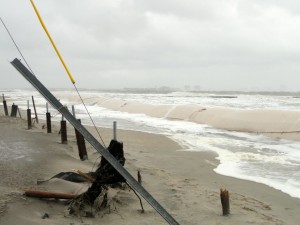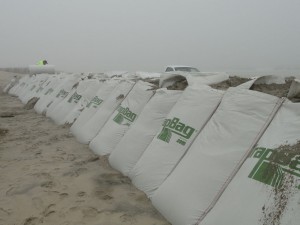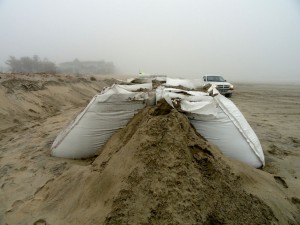A worker was finishing installation of a 200-foot section of synthetic sand bags on Friday on the beach at 57th Street — part of a demonstration of a product designed for flood and erosion protection.
A city employee works Friday to finish installing an experimental 200-foot section of 'Trap Bags' on the beach at 57th Street in Ocean City. The synthetic sand bags are designed as a protective barrier on eroding beaches.
Sentinel Barriers, a company based in Fort Myers Beach, Fla., provided its TrapBag barrier system for free as part of an effort to promote the new product on the East Coast.
The system works like the geotubes installed in 2011 on the beaches at the northern end of Ocean City. The geotubes are massive cylindrical sleeves of sand that worked successfully in protecting the Gardens section of Ocean City in Superstorm Sandy.
Unlike geotubes, the TrapBag system consists of smaller bags connected side-by-side like an accordion. The company says the system makes it easier to repair and replace sections and even to install new sections in while water is already starting to flow around them.
Everett “Buzz” Waid devised the TrapBag system after Hurricane Charley struck Florida in 2004. The product has been used in the Everglades, for flash-flood erosion protection in river towns and to protect bridge foundations.

Geotubes held back the ocean at Waverly Beach during and in the immediate aftermath of Superstorm Sandy in Ocean City.
The cells are made of high-strength recycled plastic and filled with sand. When the installation is complete, they will be covered with sand.
While further use of TrapBags is not part of any current Ocean City capital plan, the experiment is taking place at a section of beach that was vulnerable to erosion even before Sandy flattened the dune system in October 2012.
A temporary sand berm was created — largely with sand removed from the streets — and the south end is awaiting an approved Army Corps of Engineers beach replenishment project that is expected to begin in late summer or early fall.




